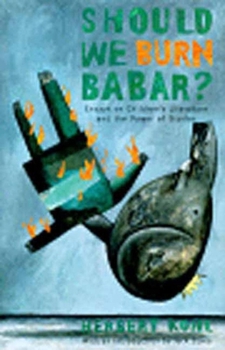Should We Burn Babar?: Essays on Children's Literature and the Power of Stories
Select Format
Select Condition 
Book Overview
In "provocative and entertaining essays that] will appeal to reflective readers, parents, and educators" (Library Journal), one of the country's foremost education writers looks at the stories we tell our children. Available now in a revised edition, including a new essay on the importance of "stoop-sitting" and storytelling, Should We Burn Babar? challenges some of the chestnuts of children's literature. Highlighting instances of...
Format:Paperback
Language:English
ISBN:1565842596
ISBN13:9781565842595
Release Date:August 1996
Publisher:New Press
Length:192 Pages
Weight:0.85 lbs.
Dimensions:0.6" x 5.5" x 8.3"
Age Range:4 to 8 years
Customer Reviews
3 ratings
A book with meaning
Published by Thriftbooks.com User , 19 years ago
This is a great work of literary criticism because it is actually relevant to our lives. Herbert Kohl's starting point is, what do we do about sexist, racist or undemocratic children's literature that is deeply rooted in the American cultural tradition? Should we censor these stories from our impressionable youth? Should we just ignore them? Or do we confront them and disentangle their reactionary ideologies from their beloved storylines? Kohl's critique of Babar--the classic children's book about an orphaned Elephant who becomes king--is both well thought out and thought-provoking. The story of Babar does not tell us that colonialism is good or that certain men deserve to rule over others. Yet these ideas come across subtly through the story. They influence discreetly the way in which children think (or better yet, do not think) about how the world works or should work. Although he drags on a little long to make his point, Kohl's chapter on Rosa Parks is perhaps his best, most important contribution. Here we have an example of an incredibly important event in the struggle for equality and justice in recent history terribly distorted throughout children's literature. The gross over-simplification of the Montgomery Bus Boycott ("Rosa was tired. She wouldn't move. Blacks boycotted for a year and then got equal rights.") is fairly well-known. But what is really mind-boggling are the examples of recreating the history of the Boycott, by some educators and publishers, to make it more palatable to notions of political correctness. Thus, we have the inclusion of many white Southerners in the Montgomery struggle, though in reality this was a wholly Black-initiated and -led struggle! Herbert Kohl's plea for radical children's literature has resonated deeply in my bones, even if his own awkward examples have not. (He needed a stronger editor.) Once again though, he has woven history, philosophy and personal biography into a powerful volume on education.
A great book--inspirational and thoughtful
Published by Thriftbooks.com User , 25 years ago
As an author/illustrator of children's books and an avid reader, I found this book a great source of inspiration--it will also be a wonderful guide for parents who are concerned about the rampant but often undiscussed stereotypes present in much children's literature.
If I had a kid in school, I'd wish Herb Kohl was her teacher
Published by Thriftbooks.com User , 25 years ago
Stories do affect us. We carry around memories of them for years, and their impact on our social behavior is immense. Kohl challenges us to look carefully at the books and stories we select for our children and at the messages, both overt and subtle, that they contain. Should be read by all caring parents (and teachers too!)






